|
 FAQ FAQ |
|


 Tweets
by @theginkgopages
Tweets
by @theginkgopages
These questions and answers are
compiled from reactions I received. If you want to comment or add
something please let me know. If you don't find your question try to find
an answer by searching The Ginkgo Pages or email me.
1. The
Ginkgo is too large for my garden. Are there smaller cultivars?
2. I
want to buy a female Ginkgo. Are they for sale?
3. Where
can I buy/get seeds or trees?
4. How
can I roast the seeds?
5. How
can I make tea from the leaves?
6. I
suffer from ...... Can Ginkgo help me for this disorder?
7. What
is the safest highest dosage of Ginkgo?
8. Where
can I get information about commercial planting of the Ginkgo?
9. Can
I prevent my female tree bearing seeds that 'smell' when on the ground
in fall?
10. How
do I take cuttings?
11. What
soil does the Ginkgo prefer?
12. How
about fertilizing the soil?
13. What's
new on The Ginkgo Pages (updates, news, discussion etc.)?
14. Where
can I find information about this website's history and Cor Kwant?
15. My
question is not answered here. How can I get more information?
Answers:
1. The Ginkgo is too large for my garden. Are there smaller cultivars?
Yes, there are. Some cultivars
are mentioned on my Tree-page.
More cultivars can be found
on the internet.
Female Ginkgos are for sale.
Read the cultivars-section
on my Tree-page .
Companies are mentioned in the
answer to question 3 of this FAQ.
3. Where can I buy/get seeds or trees?
You can try to collect seeds
from a female tree in fall (some female trees are mentioned on my Where-page),
ask in a related newsgroup, forums of GardenWeb
etc.
Many garden centers sell the
Ginkgo biloba. Special cultivars are for sale at a nursery. The Ginkgo
can often be found in the conifer catalogue.
You can check out my Forum
and Links-page and/or search the internet
etc.
Some internetsites for seeds/trees
(no connection with me nor experience), you will find many more on the
internet:
SysTax
"Botanical Gardens Information System" - Gardens
Garden
seeker USA
Green
Industry Yellow Pages (retail/wholesale)
Richters herbs.com:
seeds
B_and_T_world_seeds
Dallasbonsai.com
Greenweb.com
Mercado
libre
Mishobonsai.com
Seedrack.com
Sheffield's Seed
Company Inc.: seeds
SeedSwappers.com
The Seed Shop
Treehelp.com
Trees-seeds.com
Vreeken's Zaden Dordrecht
(nl)

Historic
trees.org
Nurseryman.com
(S.Carolina)
Growit
wholesale nursery (Texas)
Pender
Nursery Inc. (N.Carolina)
New
Ornamentals Society
Grimo Nut Nursery
(Can)
Blue Sterling
Nursery
St. Aubin Nurseries
(Ill.)
Rich's
Foxwillow Pines Nursery (Ill.)
Forestfarm.com
(Or)
Greer
Gardens (also female Ginkgos)
Dave's Nursery
(NJ)
Femrite Nursery
(Or)
Plantoregon.com
Monterey
Bay Nursery (Cal)
Nature Hills
Nursery (NE)
Dutchmasters
Nurseries Ltd. - wholesale (Can.)
GardenWeb
Australia Directory
Guildford
Town Garden Centre (au)
Nursery World - New Zealand (nz)
China National
Tree Seed Corp. + seedlings (cn)
Yayego
Inc., Chongfang Town, Tancheng County, Linyi, Shandong (cn)
Yinxingxs.com:
Jiangsu Pizhou Ginkgo Sales Center (cn)
Herrenkamper
Gärten
Baumschule
Igel (de)
Mythos Ginkgo
(de)
Kordes ľ Jungpflanzen:
'Living presents' + wholesale
Van den Berk Boomkwekerijen
(nl)
Bloemen en planten
startpagina (nl)
W.T.M. de Boer
- Boomkwekerij-potcultuur (nl)
Bomencentrum
Nederland (nl)
Bomen online
(nl)
Boomkwekerij Biloba
v.o.f. (nl)
Boomkwekerij.net
(nl)
Fa.
C. Esveld (nl)
Van Hassel Boomkwekerijen
(nl)
Kwekerij
De Horst (nl)
Intratuin (nl)
Kwekerij
De Koekoek (nl)
Kwekerij
De Limieten, grote bomen - mature trees (nl)
Van IJmeren, Opheusden
(nl)
You can roast the seeds like
for instance sunflower pits (with some salt). Read more about the seeds
as a foodsource on my
Usage-page.
5. How can I make tea from the leaves?
After picking the green
leaves (late summer/early fall), shade-dry them on a screen, allowing good
air circulation from the bottom and the top. Best condition is one that
will dry the leaves quickly but not overheat them. Never dry leaves in
the sun. To test that the leaves are thoroughly dried, "snap" a leaf stem
to make sure.
You may also dry them in your
microwave. Put some leaves between two paper towels and microwave for 60
seconds on high. If crisp, the leaves are dry, otherwise microwave further
at 15 seconds intervals.
When the leaves are dried, put
them in a paper bag inside a plastic bag, and store them in a cool, dark
place - in a tinted glass jar is best.
For dosage read the site of
the American
Botanical Council and the related links on my Links-page.
You may also read my Forum-Blog.
6. I
suffer from ...... Can Ginkgo help me for this disorder?
Sorry, it's impossible and beyond
my scope, qualification and intention to discuss all disorders on my pages
nor can I judge the efficacy and effects for each individual. Read my
Usage-page and consider this only as information.
For details, dosage and possible
side-effects read the links with medicinal information on my Links-page,
including the Medline, use search engines etc.
A good link is for instance
American
Botanical Council.
You can also consult a health
care practitioner with experience in this area.
Also check out my Literature-page.
7. What is the safest dosage of Ginkgo?
Please check out my Links-page
(medicinal links) for this and question 6.
A good link is for instance
American
Botanical Council.
You can read my Forum-blog
or ask your question/give answers there.
9. Can I prevent my female tree bearing seeds that 'smell' when lying on the ground?
Applying a plant growth regulator
by a professional tree expert might help in reducing seed development.
But why should you do that?
The female Ginkgo has a stigma.
While still on the tree the seeds do not smell at all. In fall when the
seeds drop to the ground they can produce a distinct smell because
the seedcoat that contains butyric acid is rotting away, but I think it's
exaggerated to say they stink (did you ever smell a rotting apple or Limburger
or Parmesan cheese?).
 The
Ginkgo is a living fossil, it is nature! In Asia they love the seeds! And
if you read my pages about the seeds you'll respect them more, even the
dinosaurs loved them.
The
Ginkgo is a living fossil, it is nature! In Asia they love the seeds! And
if you read my pages about the seeds you'll respect them more, even the
dinosaurs loved them.
If the female tree is planted
where walking over the seeds can be avoided there should be no problem.
Besides cleaned up regularly there should be no problem at all! Or gather
them to use in cooking.
Some Chinese/Japanese people
like to collect the seeds, try to contact them or put a small add on a
noticeboard or in a local paper.
The 'smell' diminishes
when you add sand and/or baking soda (sodium bicarbonate) to the fallen
seeds.
More information about the female tree and seeds on my Propagation , Tree and Usage pages.
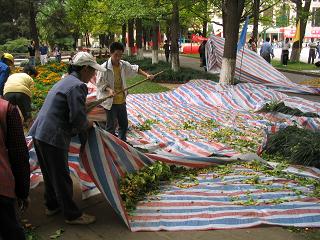
Ginkgo seeds gathering in China at Yunnan University in Kunming. Some tarps are put on the ground; several men climb the trees wielding giant bamboo staffs which they use to knock all the branches. The loosely attached seeds pour off the tree onto the tarp. |
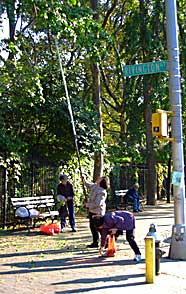
Women use a bamboo stick to gather Ginkgo seeds in New York. The seeds are used in Asian cooking, as a medicine etc. |
| . | . |
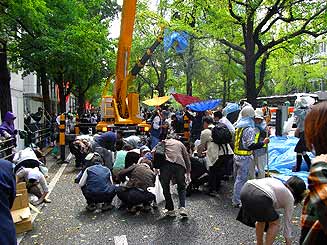 Ginkgo
seeds gathering: Midosuji Boulevard in Osaka, Japan. All you need is an
umbrella! Ginkgo
seeds gathering: Midosuji Boulevard in Osaka, Japan. All you need is an
umbrella!
Read more about the usage of the seeds on my Usage-page. |
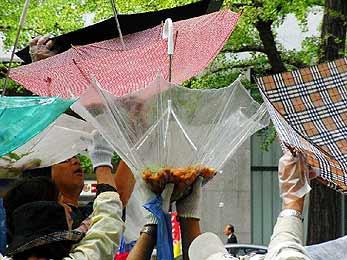 |
Read my Propagation-page
and Links-page about this.
11. What soil does the Ginkgo prefer?
The Ginkgo likes well-drained,
moist (not wet), deep soil and a sunny position.
Also read my Tree-page.
You may use a balanced mild organic
fertilizer and some compost.
Fertilize 1-2 times a year or
more or less depending on the local conditions.
To be sure you may use a testkit
to test the soil or send a sample to a testinstitute. But I don't think
that's necessary if your Ginkgo looks allright and grows well as it is
supposed to do!
13. What's new on The Ginkgo Pages?
News and more can be found on my Specials-page.
14. Where can I find information about this website's history and Cor Kwant?
You can find this information on my Awards-page: click here.
15. My question is not answered here. How can I get more information?
Please use the search box at
the top of this page or go to my Forum-Blog
or email me.
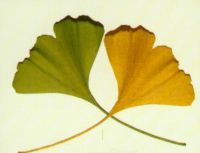 |
|
If you have additions please email me. Also I would like to hear your
experiences!
|
I am not affiliated with nor vouch for any
claims of the products offered on these links.
![]()
© Cor Kwant ![]()
Copyright information.